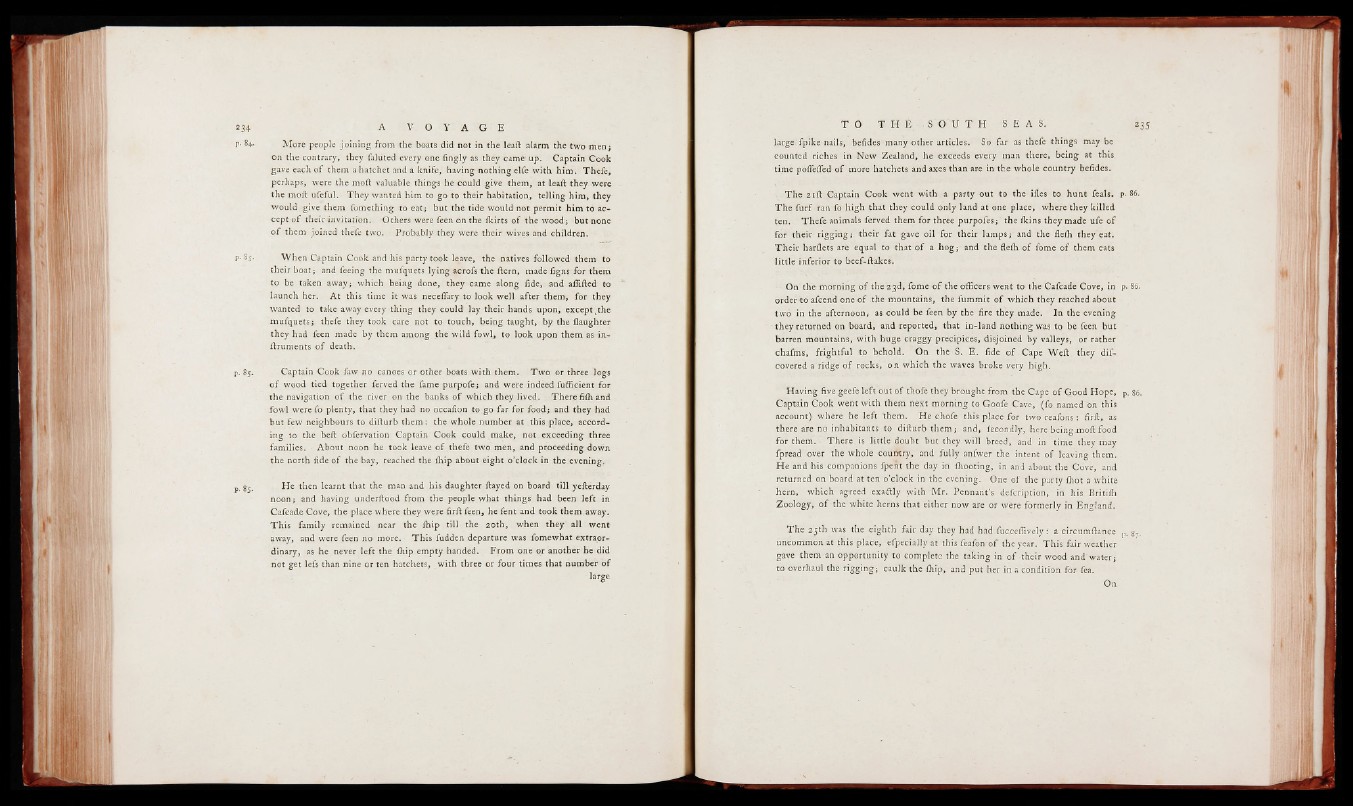
p. 84» More people joining from the boats did not in the leaft alarm the two men*
on the contrary, they faluted every one fingly as they came up. Captain Cook
gave each of them a hatchet and a knife, having nothing elfe with him. Thefe,
perhaps, were the moft valuable things he could give them, at leaft they were
the moft ufeful. They wanted him to go to their habitation, telling him, they
would give them fomething to eat; but the tide would not permit him to accept
of their invitation. Others were feen on the ikirts of the wood; but none
o f them joined thefe two. Probably they were their wives and children.
p. 85. When Captain Cook and his party took leave, the natives followed them to
their boat; and feeing the mufquets lying acrofs the ftern, made figns for them
to be taken away; which being done, they came along fide, and afiifted to
launch her. At this time it was necefiary to look well after them, for they
wanted to take away every thing they could lay their hands upon, except ^the
mufquets ; thefe they took care not to touch, being taught, by the flaughter
they had feen made by them among the wild fowl, to look upon them as in-
ftruments of death »
p. 85. Captain Cook faw no canoes or other boats with them. Two or three logs
of wood tied together ferved the fame purpofe; and were indeed fufficient for
the navigation of the river on the banks of which they lived. There fiih and
fowl were fo plenty, that they had no occafion to go far for food ; and they had
but few neighbours to difturb them: the whole number at this place, according
to the beft obfervation Captain Cook could make, not .exceeding three
families. About noon he took leave of thefe two men, and proceeding down
the north fide of the bay, reached thé ihip about eight o’clock in the evening.
pt 8^. He then learnt that the man and his daughter ftayed on board till yefterday
noon; and having underftood from the people what things’ had been left in
Cafcade Cove, the place where they were firft feen, he fent and took them away.
This family remained near the ihip till the 20th, when they all went
- away, and were feen no more. This fudden departure was fomewhat extraordinary,
as he never left the £hip empty handed. From one or another he did
not get lefs than nine or ten hatchets, .with three or four times that number of
large fpike nails, befides many other articles. So far as thefe things maybe
counted riches in New Zealand, he exceeds every man there, being at this
time poflefled of more hatchets and axes than are in the whole country befides.
The 2ift Captain Cook went with a party out to the iiles to hunt feals. p. 86.
The furf ran fo High that they could only land at one place, where they killed
ten. Thefe animals ferved them for three purpofes; the ikins they made ufe of
for their rigging; their fat gave oil for their lamps; and the fleih they eat.
Their harflets are equal to that of a hog; and the fleih of fome of them eats
little inferior to beef-ftakes.
On the morning o f the 23d, fome of the officers went to the Cafcade Cove, in p. 86.
order'to afcend one of the mountains, the fummit of which they reached about
two in the afternoon,' as could be feen by the fire they made. In the evening
they returned on board, and reported, that in-land nothing was to be feen but
barren mountains, with huge craggy precipices, disjoined by valleys, or rather
chafms, frightful to behold. On the S. E. fide of Cape Weft they discovered
a ridge of rocks, on which the waves broke very high.
Having five geefe left out of tliofe they brought from the Cape of Good Hope, p. 86.
Captain Cook went with them next morning to Goofe Cave, (fo named'on this
account) where he left them. He chofe this place for two reafons: firft, as
there are no inhabitants to difturb them;, and, iecondly, here being .moft food
for them. There, is little doubt but they will breed, and in time they may
fpread over the whole country, and fully anfwer the intent of leaving them.
He and his companions fpent the day in ihooting, in and about the Cove, and
returned on board at ten o’clock in the evening. One of the party ihot a white
hern, which agreed exadtly with' Mr. Pennant’s defcription, in his Britiih
Zoology, of the white herns that either now are or were formerly in England.
The 25th was the eighth fair day they had had fucceffively: a circumftance p. g,
uncommon at this place, efpecially at this feafon of the year. This fair weather
gave them an opportunity to complete the taking in of their wood and water;
to overhaul the rigging; caulk the ihip, and put her in a condition forYea.
On